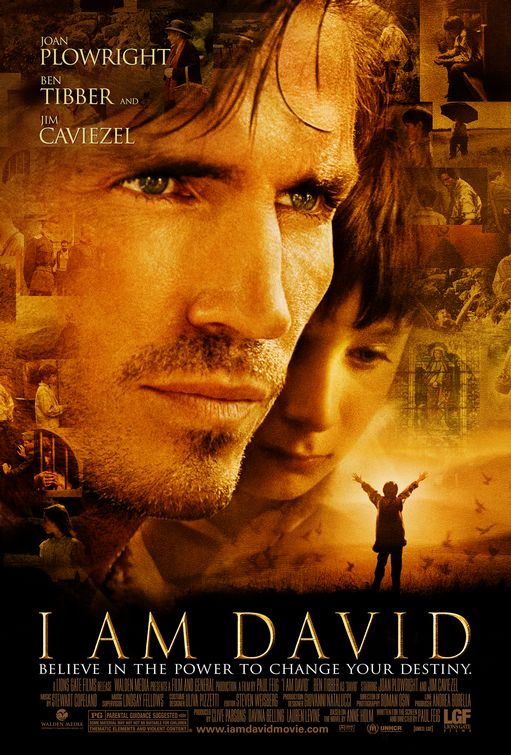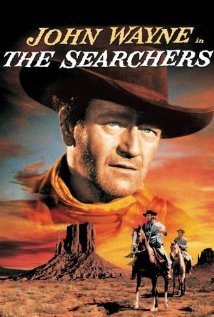“Looking for a Loved One”

| None | Light | Moderate | Heavy | |
|---|---|---|---|---|
| Language | ||||
| Violence | ||||
| Sex | ||||
| Nudity |
Content:
(CC, FR, VV, A, D, M) Moderately strong Christian worldview featuring Christian family who prays, attends church & sings hymns with Native-American religious elements & cynical hero; no foul language; moderate action violence including shooting the eyes out of a dead Indian, shooting buffalo implied, woman kicks man, man kicks woman, slapping, wrestling match with biting & shoving, several shoot-outs with the Indians resulting in death & injuries, & Indians burn homestead with several deaths implied; no sex but kissing; upper male nudity & woman walks in on man as he bathes; alcohol use; smoking; and, brief images of corpses and revenge themes, racism & anger but with a powerful redemptive ending.
More Detail:
The story begins three years after the Civil War with Wayne playing Ethan Edwards, approaching a frontier home. Looking haggard and weary, Ethan was a Confederate soldier. Ethan is greeted by his family including his brother Aaron (Walter Coy), Aaron’s wife Martha (Dorothy Jordan) and their two children, teenage Debbie and Lucy. All are happy to see Ethan, and Ethan brings out gifts, relics from the war, and then they all have dinner. During dinner, Martin Pawley (Jeffrey Hunter) arrives. One-eighth Cherokee Indian, this young man was adopted by the Edwards family after Ethan saved him as a youth from Indian attack. Because Martin is part-Indian, the bigoted Ethan treats him with disrespect, his eyes revealing the hatred within his heart. The next morning at breakfast, further interruptions occur when Sam Clayton, a reverend and a captain of the Texas Rangers, arrives. The Captain comes to enlist Ethan’s help in rounding up a neighbor’s cattle that was stolen by Comanche Indians. Ethan makes Aaron stay with the women, while he goes out with Martin and the Rangers. In one of the classic shots of American cinema, Clayton, played by Ward Bond, deliberately looks away as Martha lovingly gives Ethan his Confederate coat while Ethan kisses her on the forehead. Are Ethan’s feelings for Martha, his brother’s wife, one of the reasons he didn’t return after the War? As Ethan leaves with the others, Martha and little Debbie stare into the distance after them.
Ethan, Martin and the Rangers eventually find the cattle slaughtered and realize it was all a trick to get the men to leave so that the Comanches could raid Aaron and Martha’s homestead. On returning to the home, they find the house burned, the adults brutally killed (off-screen) and little Debbie kidnapped. Enraged, Ethan and Martin vow to search the whole west to recover Debbie from the Indians.
As they search, they spend long nights out on the open range, visit saloons for tips, shoot at some Indians, shoot at some robbers, and make a pit stop at the home of the neighbors, the Jorgensens, where Martin is romanced by their anxious daughter, Laurie (Vera Miles). Although Martin is attracted to her and she to him, his sense of duty is greater, and he leaves her disgruntled and desirous to marry. Ethan and Martin hit the trail again, Martin purchases an Indian wife, and they find the Comanche camp run by a wicked chief named Scar, who is out to avenge his sons killed by white people. Inside the camp is now a grown Debbie (played by a young Natalie Wood). Ethan thinks she is no longer white and wants to kill her when she secretly visits their camp, but Martin protects her, a creek bed standing between him and Ethan, signifying their differences. An Indian arrow stops Ethan just in the nick of time, and he and Martin barely escape. Back at their home, a final showdown with the Indians ensues, with the goal to pull Debbie from the clutches of Scar. Can Martin stop Ethan before he murders Debbie?
THE SEARCHERS was made before the days of political correctness. The women are docile, but feisty, domestic engineers, swooning over men and cooking. Ethan and Martin, conversely, are rough and tough. At one point, Martin kicks his unfortunate, well-meaning Indian “bride.” Finally, the lead Indian is played by a Caucasian, and the Indians’ presence is seen as threatening. Unlike the recent DANCES WITH WOLVES, no attempt is made to understand or appreciate the Indian culture, although DANCES itself is an idealized portrait of Indians and may be considered to be a racist diatribe against white American society of the 1800s. Yet, all these things do not diminish the complexity, beauty and emotional pull that THE SEARCHERS displays. THE SEARCHERS is actually a transitional film from the 1950s that makes a strong statement against racism.
The wide-open space photography in THE SEARCHERS is breathtaking, and the interiors are detailed. Director John Ford arranges his images here in a wonderfully unique way, a quality which has earned this film a mention by some critics as one of the top ten cinematic masterpieces of all time. Both the lead actors and the supporting actors excel. Particularly memorable is the slightly crazy, certainly goofy Mose Harper (Hank Worden), who helps out from time to time in Ethan’s quest. Mose refreshingly displays gratitude to his fellow man and to God, even in the midst of danger. Christian audiences will also appreciate the hymn singing, prayers and Scripture cited at a funeral and a wedding. John Ford is a filmmaker who remembers his history lessons, that America was primarily populated by practicing Christians in the past. Even the cynical and jaded character Wayne plays bows his head during a prayer before a meal.
THE SEARCHERS was produced before MPAA ratings came into effect, so therefore it uses restraint when displaying battles and attacks. The audience does not need to see the murdered or burnt bodies of the Edwards family to know the devastating blow it has on Ethan and Martin. Likewise, the shootouts are primarily bloodless. While this may not be authentic, it allows THE SEARCHERS to be accessible to a greater audience, including older children, and hence can be appreciated by some complete families or at least more members of the family.
This movie has John Wayne in perhaps his most complex role, which he often said was his favorite. The main premise of the movie is whether his character Ethan will turn away from his path of hatred and revenge. Ethan is the archetypal Western hero who has undergone a tragic loss and who must decide if he will serve the community or his own sinful passions.
When Western fans think of some of the best of this genre, THE SEARCHERS is almost certain to land on their list. It’s definitely worth a look and is now available in a Blu-ray version with another classic John Wayne performance, TRUE GRIT.


 - Content:
- Content: 
